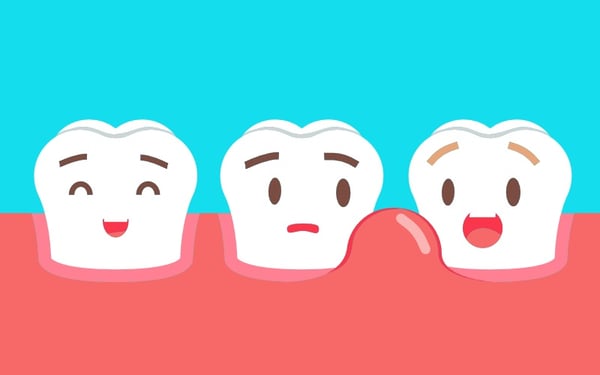
Are your gums sore, tender and swollen? Do they bleed when brushing your teeth? If so, you may be suffering from periodontitis as these are some of the main symptoms. If you have this problem, you're not alone. About 8.52 percent of 20-64-year-olds deal with periodontitis, which is also called periodontal disease.
Here are some of the common symptoms of periodontal disease, along with a few considerations and warnings and why it's important to have a professional dental cleaning.
What Is Periodontitis and What Causes It?
Perhaps you're not quite sure what's meant by periodontitis. Simply put, periodontitis, which is also known as gum disease, is a severe gum infection that can lead to tooth loss. This type of gum disease infects the tissue holding the teeth in place.
It's the result of bacteria or sticky, colorless plaque building up on teeth and gum, which is usually caused by poor oral hygiene, such as failing to properly brush and/or floss your teeth. As a result, significant damage can be done to the bones and teeth. Fortunately, you can stop the damage if you treat periodontitis early and start practicing good dental hygiene at home.
Common Symptoms
Besides red, swollen and tender gums that bleed when brushing, there are several other common symptoms of periodontitis, such as:
- Bad breath and a foul taste in your mouth
- Plaque or tartar accumulation on teeth
- Tooth loss
- Pain when chewing food
- Loose teeth or changes in tooth position
- Receding gums or noting teeth that appear to be longer
The Three Stages of Periodontitis
The symptoms of gum disease largely depend on the stage of the disease.
Gingivitis—The first stage is inflammation of the gums, which is known medically as gingivitis. An initial sign of gingivitis is having gums that bleed when brushing and flossing your teeth. Another "red light" is discovering staining on your teeth, which is known as plaque.
Moderate gum disease—If periodontitis isn't stopped early, it can progress to moderate gum disease. This usually entails bleeding, besides pain around your teeth and gums, in addition to gums that seem to pull away or recede. The reason your gums are pulling away from your teeth is because your immune system is trying to fight the infection. As result, your gums may bleed when you brush and/or floss your teeth. Even worse, your teeth may lose bone support, so they become loose. In fact, the infection can cause inflammation throughout your entire body.
Advanced stage of gum disease—This stage involves the deterioration of the connective tissue responsible for holding your teeth in place. In other words, the bones, gums and tissues supporting your teeth are destroyed. People with advanced gum disease may experience significant pain when they chew, have bad breath and a foul taste in their mouth.
Treatment Options
How periodontitis is treated depends on the progression of the disease.
Nonsurgical or less invasive treatments—The early stage generally doesn't involve invasive measures and may include treatments, such as scaling, root planing and using topical or oral antibiotics for controlling bacterial infection. Scaling is a treatment that entails the removal of bacteria and plaque by using laser or ultrasonic devices. Root planing is done by smoothing the root surfaces to discourage the continued buildup of bacteria and tartar.
Surgical treatments—Dental surgery may be needed for advanced periodontitis, such as flap (pocket reduction) surgery, bone grafting and soft tissue grafts. Other procedures include guided tissue regeneration and applying specific gels to diseased tooth roots (tissue-stimulating proteins).
People Most at Risk
Some people are more at risk for gum disease than others, such as:
- Smokers
- Black and Hispanics
- Older adults
- Those in lower income brackets
- Adults with less education
Considerations and Warnings
- Besides smoking, there are other risk factors, such as female hormonal changes and taking medications that affect saliva flow.
- Diabetes, AIDS and other specific illnesses can lead to gum disease.
- Plaque that isn't removed can easily harden, forming tartar that can't be cleaned by just brushing.
- It takes a professional cleaning, done by a dental hygienist or dentist, to remove tartar.
- Regardless of the kind of treatment a dentist uses, they all require that patients practice proper oral hygiene at home.
You don't have to continue to suffer from gum disease because it can be treated as well as prevented. You can trust Dr. William Linger to give you the highest quality dental services possible. Please contact us and download our free eBook.



